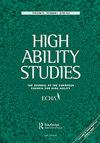Training preparatory mathematics students to be high ability self-regulators: Comparative and case-study analyses of impact on learning behavior and achievement
IF 1.3
4区 教育学
Q2 EDUCATION, SPECIAL
引用次数: 9
Abstract
ABSTRACT The ability to self-regulate learning (SRL) is a skill theorized to transfer across learning environments. Students with this ability can consider a learning task, identify a goal, develop a plan to achieve it, execute that plan, and monitor and adapt learning until the goal is met. This paper examines the educational implications of developing the SRL expertise of high and typical-ability students, as operationalized by high school performance, who entered college and struggled with mathematics in their 1st year. Students who initially failed a 6-week intensive college math course completed a 3-h SRL training mid-semester and re-engaged in math learning with an adaptive problem-solving program and resources hosted on a course website. Students trained to evaluate tasks, plan, employ cognitive strategies, and monitor learning behaved distinctly from those who completed a math refresher course. Non-parametric, comparative analyses revealed that SRL-trained students more efficiently mastered math topics during digital problem-solving, demonstrating superior learning efficiency. Under a sequential explanatory mixed methods design, a follow-up multiple case study approach aligned to the Situated Model of SRL traced adaptive learning processes employed by multiple high-ability self-regulators and contrasted them with learning processes of exemplar learners from the untrained group.培养数学预科生成为高能力的自我调节者:对学习行为和成绩影响的比较与案例分析
自我调节学习能力(SRL)是一种理论上可以在学习环境中迁移的技能。具有这种能力的学生可以考虑学习任务,确定目标,制定实现目标的计划,执行该计划,并监督和调整学习,直到达到目标。本文研究了培养高能力和典型能力学生的SRL专业知识的教育意义,这些学生在进入大学并在第一年与数学作斗争时,通过高中表现来操作。最初未能通过为期6周的大学数学强化课程的学生在学期中期完成了为期3小时的SRL培训,并通过课程网站上的自适应解决问题计划和资源重新参与数学学习。接受过评估任务、计划、使用认知策略和监控学习的学生与完成数学复习课程的学生表现不同。非参数比较分析显示,SRL培训的学生在数字问题解决过程中更有效地掌握了数学主题,显示出卓越的学习效率。在顺序解释混合方法设计下,一种与SRL情境模型相一致的后续多案例研究方法追踪了多个高能力自我调节者采用的自适应学习过程,并将其与未经训练组的示例学习者的学习过程进行了对比。
本文章由计算机程序翻译,如有差异,请以英文原文为准。
求助全文
约1分钟内获得全文
求助全文
来源期刊

High Ability Studies
Multiple-
CiteScore
4.80
自引率
11.10%
发文量
7
期刊介绍:
High Ability Studies provides a forum for scholars in a variety of disciplines associated with the development of human abilities to their highest level. It is a medium for the promotion of high ability, whether through the communication of scientific research, theory, or the exchange of practical experience and ideas. The contents of this journal are unique in reflecting concerns and recent developments in this area from childhood and across the whole life span in a variety of contexts. Far from being restricted to the traditional focus on high-level cognitive development, it also presents investigations into all other areas of human endeavour, including sport, technology, the arts, business, management and social relations.
 求助内容:
求助内容: 应助结果提醒方式:
应助结果提醒方式:


